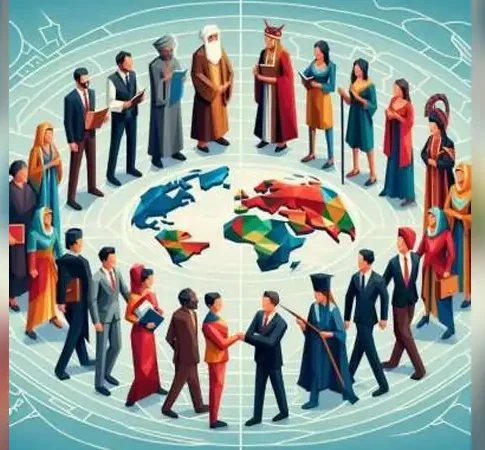In the modern era, education has revolutionised national assets and strategic mechanisms of diplomacy, and has integrated this in different parts of the world. This integration is rapidly increasing to foster international compliance, understand cultural values, and learn the global narrative structure of every region. However, due to political polarisation, a geopolitical conflict has been rooted in history over the past few decades, frequently affecting the inter connectivity of cross-cultural values, the student exchange system, and cross-border curriculum design.
In global diplomacy, education is not merely confined to national interests gaining knowledge for passing examinations but it also fosters tactfulness in bringing countries together through collaboration, as a sign of negotiations, and exchanging students who explore the importance of cross-cultural understanding. Shaping up the generation is not a sign of competition, but rather a fundamental asset in forming peace. And peace-building cannot be solely sustained through ceasefires; rather, cultural and educational negotiations played a subtle and influential role in improving the cross-border alliance. These educational dialogues, such as international student exchange programs, joint research programs, and the signing of Nous with cross-border universities, are being conducted to strengthen the connections further to peace building.
After the drastic change in technology, the world has transformed into a global village, as it has removed the entire walls of distance and communication barriers. The long distance is not a problem anymore – technology has created flexibility for students and people from different parts of the world, allowing them to collaborate virtually. Collaborative research hubs and E-learning platforms have been initiated and have become a new form of diplomacy. Students in Lagos now collaborate with their peers in the USA or Germany, and similarly, a journalist in Islamabad can work for the Wall Street Journal or the New York Times from Pakistan. Moreover, the emergence of artificial intelligence (AI) has created tools and global online programs that break barriers of nationality and distance, and build an inclusive online learning space. The expansion of digital education not only forms some global educational collaborations but also ensures global peace among countries.
In the contemporary era, educational diplomacy plays a crucial role in helping and developing conflict–affected regions to unite, as it is the first casualty of war and helps align countries towards progress and strengthen recovery bonds. When teachers, schools, and children become victims of bombardment, it not only affects the classroom but also extends to nationwide challenges. For instance, Gaza, Yemen, Afghanistan, Syria and several other conflict-ridden locations that are great sufferers of brutality, however, they still strive to rebuild trust and social cohesion to reform schools and colleges. Thus, amid the chaos of the conflict, education emerges as a silent saviour between the countries, fostering hope. Knowledge and the classroom serve as sanctuaries for children, allowing them to relive their lives, form a sense of belonging, and live normally with hope.
Education diplomacy has created multiple venues for international students, but it also creates challenges for them at the global level, where they must contend with geopolitical controversies, financial imbalances, cultural issues, and visa limitations. These limitations have significantly restricted students from participating in international educational programs. Moreover, the advanced technologies that raise the digital divide also hinder participation in international programs and activities. Sometimes, students face connectivity issues when attending virtual classrooms and lack other online tools, which discourages them from joining international curriculum societies. These challenges are not solely affecting students’ expectations; they also promote nationalism and populism in regions that shape the education system, leading to cultural intrusion for international students rather than providing an opportunity to grow.
Thus, by promoting education diplomacy, learning and cultural understanding have increased, serving as a link between countries to promote peace among them. The emergence of digitisation has empowered the world with various global collaborations. Even in regions where there is conflict, they can collaborate on education and bring peace to their countries. Moreover, strengthening education diplomacy is a sign of empathy, cooperation, and inclusivity, which helps foster peaceful learning and sustain global harmony. ( The writer can be reached at: : [email protected])


